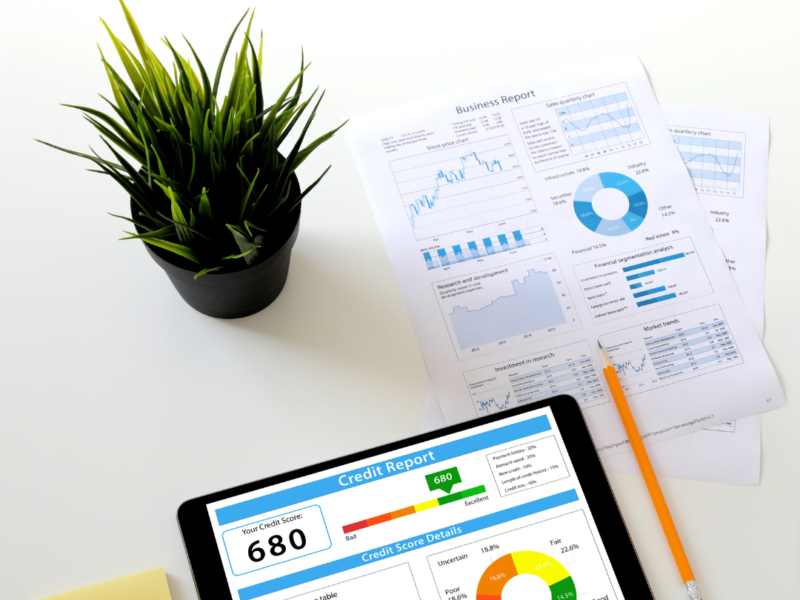Improve credit score tips — Can I improve my credit score? The basics on credit scores and realistic tips to improve your credit rating. This post contains affiliate links.
Remember when you were in school and at the end of a term you were given a grade based on your attendance, participation, and test results?
I could argue that those grades were not always fair. Other important aspects of learning were often left out of the picture.
Well guess what? Once you start adulting and paying bills, you are also given a grade based on your repayment history: you are given a credit score.
Just this time, you can’t argue the fairness of it all, since a credit score is mainly calculated based on the following:
- Your payment history
- The amount of debt you have
- How long you have had a credit history for
This information is gathered from creditors reporting your consumer history to credit reporting agencies. This is called your credit report.
In Canada, the two main credit reporting agencies are Equifax and Trans Union.
In the United States, in addition to the above two agencies, Experian is included in the three top credit bureaus.
Based on your credit report, you are given a three digit number, ranging from 300 to 900, which represents your credit worthiness. This is called your credit score.
In this post, I will show you what you can do to improve your credit score.
Let’s dive in.
Improve Credit Score Tips — Can I Improve My Credit Score?

Improve Credit Score Tips — Why Your Credit Score Matters
Banks and other financial institutions will always compliment you on how great your credit score is. They do this because they can make money off you by lending you high amounts of money.
Do I want to brag to others that I have the ability to take on loads of debt? No, thank you.
Nevertheless, having good credit is an important piece of good financial health. Other than for the purpose of borrowing money, you need to have a good credit score to apply for rentals, insurance, and in some cases, even jobs.
Additionally, if you are forced to take on debt, having a higher credit score means your interest rate will likely be on the lower side. You also have the luxury of shopping around at different lenders, giving you more negotiating power.
Improve Credit Score Tips: First Steps
The first step to improve your credit score is knowing where you stand. In other words, you need to obtain a copy of your credit report and credit score.
In Canada and the United States, the easiest way to obtain your credit report is to request it through Equifax. The last time I did it, a few months ago, it cost me less than $24 CAD and my credit report was ready within minutes – everything was done online.
Equifax also offers a more basic credit report option free of charge, but it may not show your actual score.
In Canada, some financial institutions offer a credit score feature within their Online and Mobile Banking platforms. This is an easy, cost-free way to check your score.
What Is A Good Credit Score?
To give you an idea of what your credit score means, anything below 579 is considered a poor score; 580 to 669 is considered fair; 670 to 739 is considered good; 740 to 799 very good, and any score higher than that is considered excellent.
Investopedia has a good article breaking down credit score calculations.
Now you have an idea of how good or not so good your credit score is. The next step is to review all your credit inquiries. This means verifying every company that has ever checked your credit.
This is important to ensure all inquiries were legitimately requested by you and yourself only. If there are any unauthorized credit inquiries on your file, you should contact the requestor right away for a correction.
You should also ensure your personal information is correct on your credit report. This includes name, address, date of birth and Social Insurance Number (US: Social Security Number).
Assuming all inquiries and personal information are accurate and there are no discrepancies, now it’s time to focus on your list of payments.
Obviously, your credit report will show any outstanding past-due accounts you may have. Your priority should be to pay these off as soon as possible, or at least to bring them up-to-date.
With that said, it is important to manage expectations: your credit score is not going to improve right away. It will take some time, but with consistency and discipline, it is possible for your credit score rating to go from poor to fair, fair to good, and so on.
How To Improve Your Credit Score: Important Guidelines
Ideally, you would want to pay off any outstanding credit, but this may not be always possible. If a full payment is not feasible, you should at the very least pay the minimum amount due on your statement, to avoid a late or missed payment record.
If a minimum payment is also not possible, you should contact the creditor in advance to discuss alternate payment options.
Credit reporting agencies always advise to not use your full credit limit, especially when it comes to credit cards. As a rule of thumb, it is recommended to keep you balance below 35% of your credit limit.
For example, if your credit card limit is $1,000, you should aim to use no more than $350. The reasoning behind this rule is that if you are always maximizing your credit, you are considered a high-risk borrower.
Another tip to improve your credit score is to limit the number of times creditors check your credit. This means refraining from applying for new credit as much as possible.
Because the length of your credit history matters, it may be best to stick with credit products you already own as opposed to closing them and applying for new ones. Of course, if your interest rate is crazy high and you would benefit from a lower rate, you may choose to go down that path. But applying for new credit cards for the sake of getting their sign-up bonus is not worth the effect it may have on your credit score.
To make sure you stay on track, it is a good idea to sign up for a monthly credit report monitoring. Again, Equifax offers such service at a cost, but you can also explore third-party providers such as Borrowell for a cost-free option.

Improve Credit Score Tips — Final Thoughts
Having good credit is an important component of good financial health. Although it is not an excuse to borrow money needlessly, a healthy credit score gives you peace of mind knowing that in case of an emergency, you will have no trouble getting approved for credit.
If your credit is not where you would like it to be, I hope the tips in this post help you towards your ideal credit score.
I would like to hear from my readers: have you ever struggled with your credit rating? If so, are there any other tips that helped you recover your credit?
Other Personal Finance Posts To Check Out
How To Reduce Bank Fees: 7 Foolproof Ways To Save Your Hard-Earned Money
I am not a licensed investment or tax adviser. All opinions are my own. This post may contain advertisements by Monumetric. This post may also contain internal links, affiliate links to BizBudding, Amazon, Bluehost, and Questrade, links to trusted external sites, and links to RTC social media accounts.
Connect with RTC
Twitter: @Reversethecrush
Pinterest: @reversethecrushblog
Instagram: @reversethecrush_
Facebook: @reversethecrushblog
Email: graham@reversethecrush.com


 Is Buying Fractional Shares Worth It? 5 Undeniable Benefits
Is Buying Fractional Shares Worth It? 5 Undeniable Benefits
